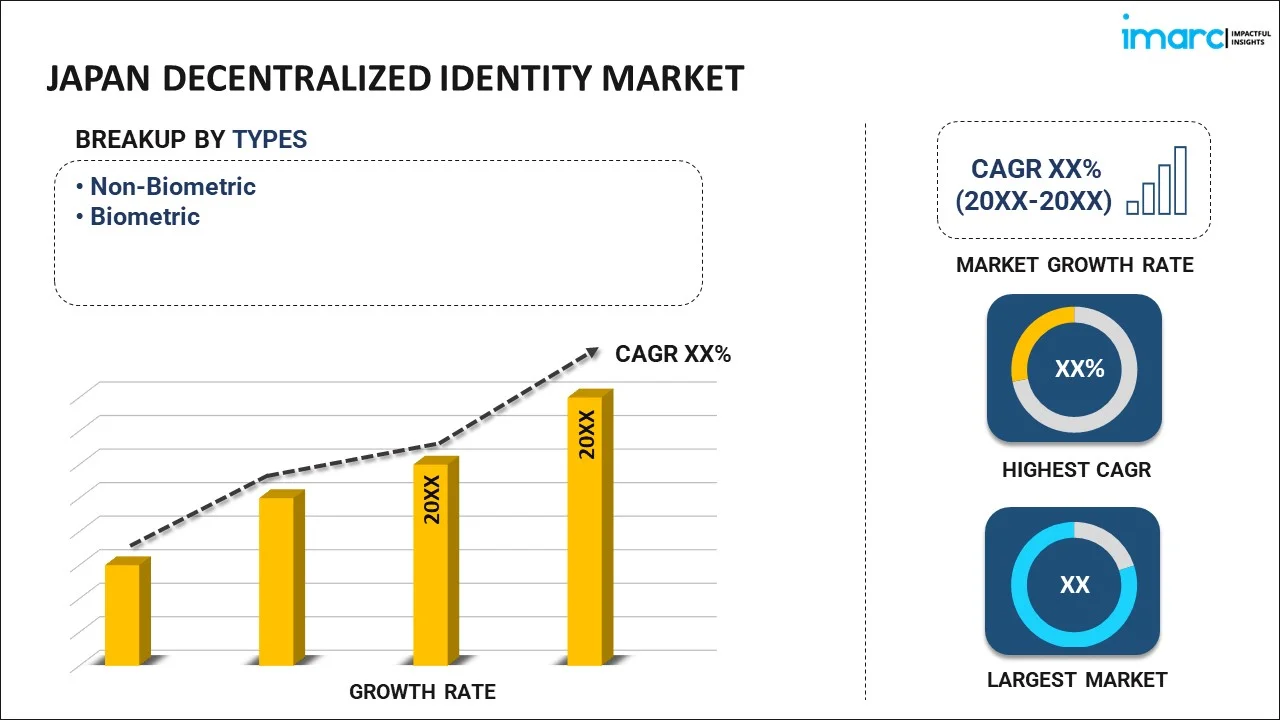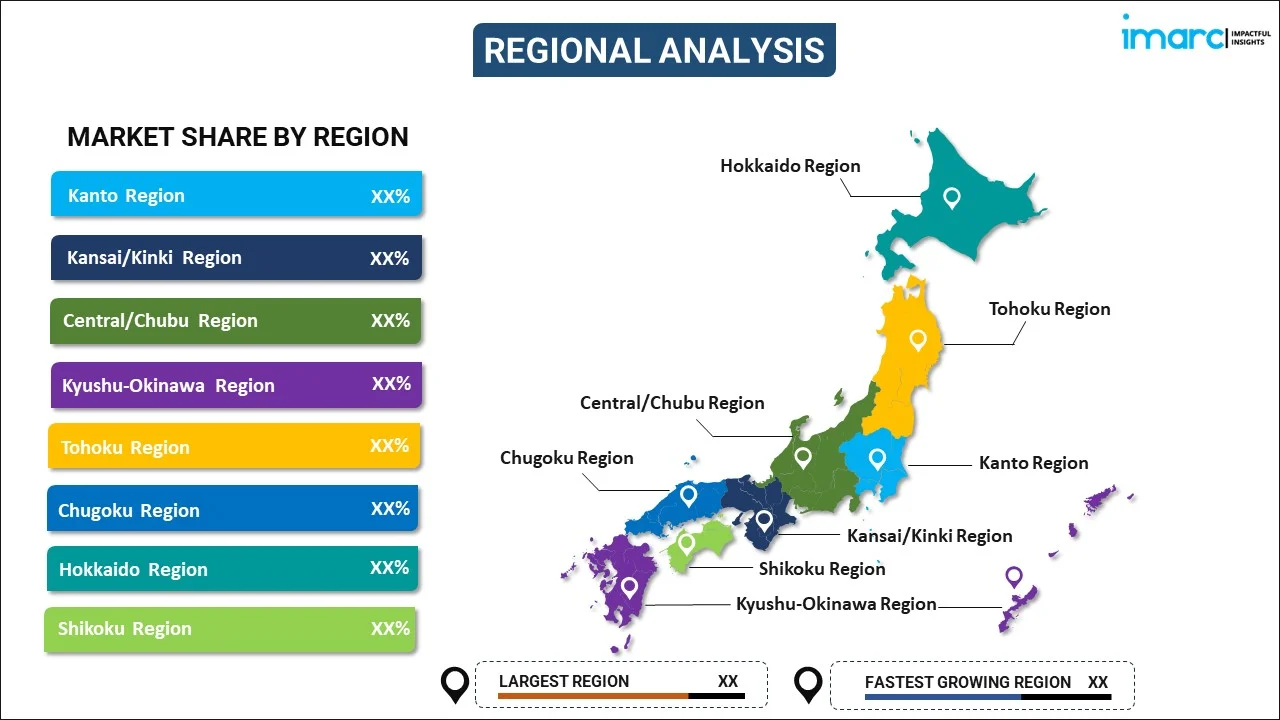
Japan Decentralized Identity Market Report by Type (Non-Biometric, Biometric), Enterprise Size (Large Enterprises, Small and Medium-sized Enterprises), Vertical (BFSI, Government, Healthcare and Life Sciences, Telecom and IT, Retail and E-Commerce, Transport and Logistics, Real Estate, Media and Entertainment, Travel and, Hospitality, and Others), and Region 2026-2034
Market Overview:
Japan decentralized identity market size reached USD 123.9 Million in 2025. Looking forward, IMARC Group expects the market to reach USD 9,539.5 Million by 2034, exhibiting a growth rate (CAGR) of 62.04% during 2026-2034. The market is being driven by several key factors, including growing concerns about gaining greater control and ownership of personal data, increased adoption of industrial applications that rely on blockchain identity, and the rapid pace of digitalization.
|
Report Attribute
|
Key Statistics
|
|---|---|
|
Base Year
|
2025 |
|
Forecast Years
|
2026-2034
|
|
Historical Years
|
2020-2025
|
| Market Size in 2025 | USD 123.9 Million |
| Market Forecast in 2034 | USD 9,539.5 Million |
| Market Growth Rate (2026-2034) | 62.04% |
Decentralized identity is a system that grants individuals full control over their personal information, securely stored in a decentralized manner. Built upon blockchain technology, decentralized identity systems are crafted to furnish individuals with privacy, security, and authority over their data. This data resides on a decentralized network, rendering it highly secure and impervious to data breaches and unauthorized access. Rather than relying on a centralized entity like a government or corporation to house and administer identity data, individuals can manage and share their data while being fully aware of where and how it is utilized. Decentralized identity thus empowers individuals to make informed choices about their digital identity.
Japan Decentralized Identity Market Trends:
The increasing desire for individuals to have more control and ownership over their personal data is a significant driving force in the market. This heightened concern arises from the growing accumulation of personal data by organizations, leading to a greater need for personal data protection. Furthermore, the surge in the sharing of personal information online, which is vulnerable to cyberattacks and breaches when intermediaries are involved, is fueling the adoption of decentralized identity systems. Additionally, the market is being positively influenced by the growing adoption of industrial applications that rely on blockchain identity. Moreover, the rapid pace of digitalization has resulted in the widespread acceptance of blockchain-based identity management across various industries, including healthcare, consumer goods, manufacturing, and retail. The market is also benefiting from the increased integration of blockchain technology into digital identity platforms to leverage Know Your Customer (KYC) information on interbank ledgers, thereby preventing duplicate KYC records. Continuous advancements in the applications of artificial intelligence (AI), machine learning (ML), and the internet of things (IoT) are further contributing to the market's growth. In addition to these factors, favorable government policies and funding initiatives that support the adoption of decentralized identity systems are creating a favorable market outlook. Furthermore, the market is expected to be propelled by the growing number of innovative business strategies, such as mergers and acquisitions (M&As), partnerships, and collaborations, undertaken by key players to enhance their geographical presence.
Japan Decentralized Identity Market Segmentation:
IMARC Group provides an analysis of the key trends in each segment of the market, along with forecasts at the country level for 2026-2034. Our report has categorized the market based on type, enterprise size, and vertical.
Type Insights:

- Non-Biometric
- Biometric
The report has provided a detailed breakup and analysis of the market based on the type. This includes non-biometric and biometric.
Enterprise Size Insights:
- Large Enterprises
- Small and Medium-sized Enterprises
A detailed breakup and analysis of the market based on the enterprise size have also been provided in the report. This includes large enterprises and small and medium-sized enterprises.
Vertical Insights:
- BFSI
- Government
- Healthcare and Life Sciences
- Telecom and IT
- Retail and E-Commerce
- Transport and Logistics
- Real Estate
- Media and Entertainment
- Travel and Hospitality
- Others
The report has provided a detailed breakup and analysis of the market based on the vertical. This includes BFSI, government, healthcare and life sciences, telecom and IT, retail and E-commerce, transport and logistics, real estate, media and entertainment, travel and hospitality, and others.
Regional Insights:

- Kanto Region
- Kansai/Kinki Region
- Central/ Chubu Region
- Kyushu-Okinawa Region
- Tohoku Region
- Chugoku Region
- Hokkaido Region
- Shikoku Region
The report has also provided a comprehensive analysis of all the major regional markets, which include Kanto Region, Kansai/Kinki Region, Central/ Chubu Region, Kyushu-Okinawa Region, Tohoku Region, Chugoku Region, Hokkaido Region, and Shikoku Region.
Competitive Landscape:
The market research report has also provided a comprehensive analysis of the competitive landscape in the market. Competitive analysis such as market structure, key player positioning, top winning strategies, competitive dashboard, and company evaluation quadrant has been covered in the report. Also, detailed profiles of all major companies have been provided.
Japan Decentralized Identity Market Report Coverage:
| Report Features | Details |
|---|---|
| Base Year of the Analysis | 2025 |
| Historical Period | 2020-2025 |
| Forecast Period | 2026-2034 |
| Units | Million USD |
| Scope of the Report | Exploration of Historical and Forecast Trends, Industry Catalysts and Challenges, Segment-Wise Historical and Predictive Market Assessment:
|
| Types Covered | Non-Biometric, Biometric |
| Enterprise Sizes Covered | Large Enterprises, Small and Medium-sized Enterprises |
| Verticals Covered | BFSI, Government, Healthcare and Life Sciences, Telecom and IT, Retail and E-Commerce, Transport and Logistics, Real Estate, Media and Entertainment, Travel and, Hospitality, Others |
| Regions Covered | Kanto Region, Kansai/Kinki Region, Central/ Chubu Region, Kyushu-Okinawa Region, Tohoku Region, Chugoku Region, Hokkaido Region, Shikoku Region |
| Customization Scope | 10% Free Customization |
| Post-Sale Analyst Support | 10-12 Weeks |
| Delivery Format | PDF and Excel through Email (We can also provide the editable version of the report in PPT/Word format on special request) |
Key Benefits for Stakeholders:
- IMARC’s industry report offers a comprehensive quantitative analysis of various market segments, historical and current market trends, market forecasts, and dynamics of the Japan decentralized identity market from 2020-2034.
- The research report provides the latest information on the market drivers, challenges, and opportunities in the Japan decentralized identity market.
- Porter's five forces analysis assist stakeholders in assessing the impact of new entrants, competitive rivalry, supplier power, buyer power, and the threat of substitution. It helps stakeholders to analyze the level of competition within the Japan decentralized identity industry and its attractiveness.
- Competitive landscape allows stakeholders to understand their competitive environment and provides an insight into the current positions of key players in the market.
Key Questions Answered in This Report
The decentralized identity market in Japan was valued at USD 123.9 Million in 2025.
The Japan decentralized identity market is projected to exhibit a CAGR of 62.04% during 2026-2034, reaching a value of USD 9,539.5 Million by 2034.
The Japan decentralized identity market is driven by the rising consciousness about data privacy, rising adoption of blockchain and secure digital solutions, and growing demand for user-controlled identity management. Regulatory support, digital transformation initiatives, and the need to prevent identity fraud further accelerate market growth.
Need more help?
- Speak to our experienced analysts for insights on the current market scenarios.
- Include additional segments and countries to customize the report as per your requirement.
- Gain an unparalleled competitive advantage in your domain by understanding how to utilize the report and positively impacting your operations and revenue.
- For further assistance, please connect with our analysts.
 Request Customization
Request Customization
 Speak to an Analyst
Speak to an Analyst
 Request Brochure
Request Brochure
 Inquire Before Buying
Inquire Before Buying




.webp)




.webp)












